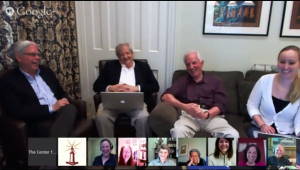We were delighted to welcome Professor Gregory Nagy (Harvard University) with his guests Professor Leonard Muellner (Brandeis University) and Douglas Frame, for an Open House Discussion.
You can watch the recording below (or on our YouTube channel), and scroll down to see a summary of the main themes discussed and links to works referenced during the discussion:
We had been invited to post questions ahead of this week’s visit and to think of discussion topics focusing on some of the following questions:
- How is kingship depicted and does it reflect the historical situation?
- If Nestor is ‘never at fault’ does that affect how we can understand his role in the Odyssey?
- Is Odysseus the last of the epic heroes, and if so, what about Telemakhos’ generation?
and on the Book Club readings for May: the first four scrolls of the Odyssey and the first chapter of Anna Bonifazi’s Homer’s Versicolored Fabric.
During the conversation, the following came up again and again, and formed a running theme throughout the discussion topics:
- the meaning of names, and names as micro-narratives, in particular how a father’s primary activity is often reflected in the name of his son
The main topics were:
- The myth and ritual of Kharila [2:19 and 28:25]
- Nestor as counselor and interpreter of signs, and how he compares with Odysseus [10:53]
- Nestor’s age and generation in the age of heroes compared with that of Telemakhos in transition [19:33]
- The education and coming-of-age of Telemakhos [33:35]
- Odysseus using ‘father of Telamakhos’ as an epithet [41:55]
- Odysseus and others breaking protocols [44:50]
- Odysseus as a Trickster figure and the role of a Winnebago Trickster [47:50]
- Whether Odysseus achieves his nostos or if it shifts in meaning because of Teiresias’ prophecy, and alternative versions of the myth [50:27]
- The role of and name of Autolykos [56:05]
Selection of references mentioned:
- The Best of the Achaeans by Gregory Nagy
- Homer’s Versicolored Fabric by Anna Bonifazi
- Greek and Roman Questions by Plutarch, and Description of Greece by Pausanias, both available online at Perseus
- Theognis of Megara, translated by Gregory Nagy, available at Kosmos Society
- ‘Telemachus The Last Hero Song‘ by Richard P Martin in Colby Quarterly
- The Trickster: A Study in American Indian Mythology by Paul Radin, Schocken Books 978-0805203516
Members can continue to discuss these themes in the Forums.
And, in conjunction with the readings of the Book Club, as we look forward to a future Open House we might think of discussion topics focusing on some of these issues, for example:
- What other examples are there of fathers reflecting their own natures when they name their sons?
- In what ways does Odysseus—or others—violate protocol?
- How does thinking of Odysseus as a Trickster figure affect the way we might understand and talk about his narrative?
For further videos please visit the Watch page.
Image credit
Telemachus departing from Nestor – by Henry Howard (1769–1847), Painter – from en:Project Gutenberg eText 13725 via Wikimedia Commons
